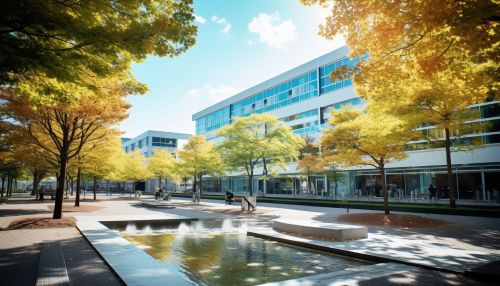Delft University of Technology
History
The Delft University of Technology, also known as TU Delft, is the oldest and largest technical university in the Netherlands. It was established on January 8, 1842, by King William II of the Netherlands as a Royal Academy with the primary purpose of training civil servants for work in the Dutch East Indies. The school rapidly expanded its research and education curriculum, becoming first a Polytechnic School in 1864, and later a full-fledged university in 1905, with the right to confer doctoral degrees.


Academics
TU Delft offers a wide range of academic programs in fields such as architecture, engineering, sciences, and design. The university is organized into eight faculties, each responsible for a specific field of study. These faculties include the Faculty of Architecture and the Built Environment, Faculty of Civil Engineering and Geosciences, Faculty of Electrical Engineering, Mathematics and Computer Science, Faculty of Industrial Design Engineering, Faculty of Mechanical, Maritime and Materials Engineering, Faculty of Aerospace Engineering, Faculty of Technology, Policy and Management, and the Faculty of Applied Sciences.
The university offers Bachelor's, Master's, and Doctoral degrees in these fields. The teaching method at TU Delft is based on problem-based learning, with a strong emphasis on practical applications and interdisciplinary approaches.
Research
Research at TU Delft is conducted within the framework of 15 research themes that reflect the multidisciplinary approach of the university. These themes include Energy, Health, Infrastructures & Mobility, and Climate Action, among others. The university is home to numerous research institutes, including the Delft Institute of Applied Mathematics, the Kavli Institute of Nanoscience, and the Reactor Institute Delft.
TU Delft is known for its high research output and has been ranked among the top universities worldwide for engineering and technology. The university has a strong focus on societal impact and aims to translate its research results into practical applications that can contribute to solving global challenges.
Campus
The TU Delft campus is located in the city of Delft, in the province of South Holland. The campus spans over 161 hectares and includes more than 40 buildings, including lecture halls, research laboratories, and student housing facilities. The campus is known for its modern architecture and sustainable design, with many buildings being awarded for their innovative and energy-efficient design.
Student Life
TU Delft has a vibrant student life, with more than 100 student associations and clubs covering a wide range of interests. These include cultural societies, sports clubs, and academic associations. The university also offers a variety of services to support students, including counseling services, career advice, and housing assistance.
Notable Alumni
Over the years, TU Delft has produced many notable alumni who have made significant contributions to various fields. These include aerospace engineer and astronaut André Kuipers, architect Rem Koolhaas, and civil engineer and inventor of the compact disc Kees Schouhamer Immink.
